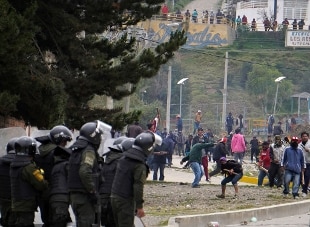- Bolivia, Evo Morales: arrest warrant for me. The police chief denies this
- Crisis in Bolivia, Morales announces his resignation
- Bolivia, Armed Forces to Morales: "Resign immediately"
- Bolivia: Morales wins in the first round, confirmed to the presidency
- Bolivia, clashes between police and opponents. Mesa: "Either I go to jail or become president"
- Bolivia, Morales claims electoral victory and the square rises
Share
by Tiziana Di Giovannandrea 11 November 2019The forced resignation and the departure of Evo Morales, former president of Bolivia, have thrown the country into an even more serious situation.Morales, pursued by violent street demonstrations and police hostility, left Sunday 10 November, aboard the presidential plane, La Paz, towards Chimorè, in the Cochabamba area.
From this moment his traces have been lost. He does not know where he currently is. It is assumed that it is in the Cochabamba area but it is not certain.
Meanwhile, Mexico has decided to grant political asylum to the former president who led Bolivia 13 consecutive years. The first indigenous president in the history of the country was the winner in the last political elections of October 20, characterized by rigging that sparked violent street protests for three consecutive weeks. Rogue in the vote that Morales himself admitted announcing new elections. Now, however, Bolivia is in a power vacuum because all the successors envisaged by the Bolivian Constitution in the event of the President's farewell have resigned with him: the vice president Alvaro Garcia Linera, the president and vice president of the Senate and the president of the Chamber of Deputies.
At this point, the second vice president of the Senate, Jeanine Añez, from the opposition, who has promised to call new elections so that "on January 22nd we have an elected president," is to claim the right to become head of state. However, the appointment of Morales's acting deputy legally belongs to Parliament, where supporters of the resigning president are in the majority. Even today there have been clashes between Morales supporters and the Police with written, broken windows and looted shops.
In addition, many parliamentarians find themselves in difficulty because they are unable to reach La Paz because of transport problems due to the unrest.
Morales tweeting from Chapare in the Cochabamba area called on the opposition to "assume its responsibility" to "pacify the country and ensure political stability and peaceful coexistence of our people". He also accused his opposition rivals, Carlos Mesa and Fernando Camacho, of being "racist and coup". Camacho is the leader of the opposition in Santa Cruz, Bolivia's economic capital. Mesa, a former president, finished second after Morales in the October 20 elections. Initially Morales had announced that an arrest warrant weighed on him, which was denied by the police, whose head Yuri Calderon resigned. The police also arrested the president of the Supreme Electoral Court, Maria Eugenia Choque, and her vice-president, on the orders of the prosecutor who investigates the alleged irregularities in the October vote. Interior Minister Carlos Romero, one of the last to have resigned, according to Argentine newspaper Clarin took refuge in the Argentine embassy in La Paz.
Donald Trump , president of the United States, said that Morales's resignation is "a strong signal for illegitimate regimes" and "an important moment for democracy". What happened "is an example for Venezuela and Nicaragua".
Support for the president forced to resign came from Cuba, Venezuela and Russia, who spoke of a coup.

